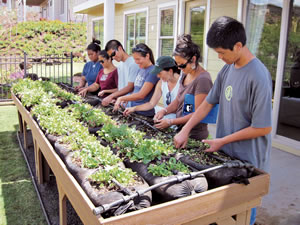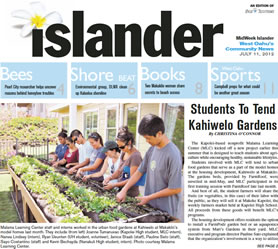Students To Tend Kahiwelo Gardens

Malama Learning Center staff and interns worked in the urban food gardens at Kahiwelo at Makakilo’s model homes last month. They include (from left) Joanne Tumanuvao (Kapolei High student, MLC intern), Nanea Lindsey (intern), Ryan Ueunten (UH student, volunteer), Janice Staab (staff), Pauline Sato (staff), Sayo Costantino (staff) and Kevin Bechayda (Nanakuli High student, intern). Photo courtesy Malama Learning Center.
The Kapolei-based nonprofit Malama Learning Center (MLC) kicked off a new project earlier this summer that is designed to teach students about agriculture while encouraging healthy, sustainable lifestyles.
Students involved with MLC will tend to urban food gardens that serve as a part of the model homes at the housing development, Kahiwelo at Makakilo. The gardens beds, provided by FarmRoof, were unveiled in mid-May, and MLC participated in its first training session with FarmRoof late last month.
And best of all, the student farmers will share the fruits (or vegetables, in this case) of their labor with the public, as they will sell it at Makeke Kapolei, the weekly farmers market held at Kapolei High School. All proceeds from these goods will benefit MLC’s programs.
The housing development offers residents the option to install a FarmPodz garden bed or an aquaponics system from Mari’s Gardens in their yard. MLC executive and program director Pauline Sato explained that the organization’s involvement is a way to utilize the produce from the gardens, rather than have it serve merely demonstrative purposes.
“There are a lot of goods – everything from herbs like sage and lavender, and then they also have … orange trees, lychee trees … Then there are greens including baby kale and arugula,” Sato said.
“There must be more than 30 different species of plants, and they are all edible.” Other goods could include lemon basil, Hawaiian chili peppers and a variety of greens.
Sato, along with a small group of MLC staff members and interns, received training on planting, fertilizing and harvesting – all things that the students will be involved with when school resumes.
Sato added that she hopes to take small groups of students to work in the garden once a week. In the future, they also may work with aquaponics systems.
In addition to providing produce for Makeke Kapolei, this project offers students a range of educational activities. “There obviously is agriculture,” Sato said, “and there is a lot of science to it as well. And there is also marketing involved – how do we package it, how do we sell it.
“That is how we are approaching it – as an opportunity to give students real life skills that they could use in other projects as well.
“I think those skills are tied to larger educational goals, but I think in the bigger sense, (students) will learn that you can and you should grow your own food,” Sato said. “The students can see that part of the solution to Hawaii’s larger sustainability issues is an individual action, and an individual choice that you make. So that is what I hope they get out of it as well.”
So far, MLC has planted two rows of seeds in the garden. Sato anticipates that the first batch of crops will be ready to harvest either this week or next week.






